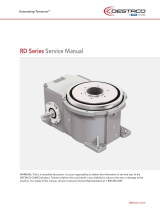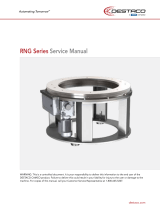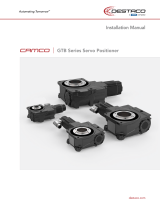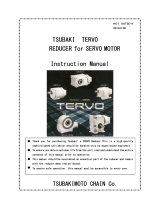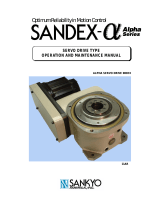
14
Cam & Limit Switch Functions
Cam & Limit Switches serve two purposes:
1. Some customers desire an
electrical signal somewhere during
dwell in order to trigger another
device such as a cylinder, punch
press, loader, etc.
2. To signal the dwell position for a
cycle on demand application. In
cycling, the input is signaled to
stop somewhere in dwell position.
This stopping may be done either
by stopping the motor or using a
clutch brake to disconnect the
motor from indexer input. Either of
these methods allows operation of
the Index Drive near its rated
capacity (shortest motion time)
and, by controlling the time the
indexer stops, give the customer
his desired dwell time.
CAUTION: There are several ways to
misapply the limit switch. One of the
most common problems is failure to
stop the unit in dwell. Starting and
stopping in motion may overload the indexer and open up or trip the overload clutch (if supplied).
The dwell position can be found by checking the indexer output for movement by means of an
indicator or by observing the appropriate notes in our DESTACO assembly drawings.
Type 2 motions require double-lobe trip cams since one revolution of the input has two dwells. Type
2 units are typically used when a higher number of stops is required. Please remember that
DESTACO cannot preset the trip cam. Every customer has different requirements which make
standardization very difficult.
Another potential problem is double indexing. This can happen if the limit switch does not close the
contacts for a sufficient period necessary to energize the holding relay. Higher speed operation or an
improperly adjusted limit switch may cause this problem.
INPUT SHAFT KEYWAY POSITION
AT CENTER OF DWELL
ROLLER GEAR
A Standard Roller Gear unit with
Cam & Limit Switch mounted on
the housing has a correct keyway
dwell position of directly opposite
the output (center of rotation), 90°
CW from the cam lobe. The Cam
& Limit Switch may also be
mounted on the reducer. NOTE:
On some RDM units (such as the
601RDM), the Cam and Limit
Switch is mounted on an angle.
Cam and Limit Switch may also be
mounted on the reducer
RIGHT ANGLE
A standard right angle unit with the
cam and limit switch mounted on
the housing has a correct keyway
dwell position directly opposite of
the cam lobe. Cam and Limit
Switch may also be mounted on
the reducer
PARALLEL
A standard parallel unit with the
cam & limit switch mounted on the
housing has a correct keyway
dwell position directly opposite of
the output shaft, 90° from the Cam
lobe. Cam and Limit Switch may
also be mounted on the reducer




















